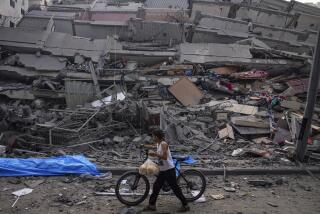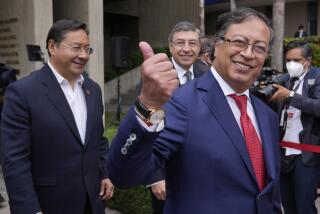Pretoria Warns Foreign Media on Strife News
- Share via
PRETORIA, South Africa — The government warned foreign correspondents here Friday that they must adhere strictly to new regulations limiting coverage of the country’s continuing civil strife, or face deportation or imprisonment.
David Steward, chief of the government’s new information bureau, said that foreign coverage of the unrest here over the past two years had become “part of the syndrome” that encourages fu1920231525and that Pretoria is determined to change this by limiting coverage of the growing conflict here.
The government intends, he said, to enforce on foreign news media as well as domestic the far-reaching press-control regulations that came into effect with the new nationwide state of emergency Thursday.
Must ‘Play by the Rules’
“We expect the media to play by the rules, as tough as they may be,” Steward told a press conference here, “and we will not hesitate to take action against any media that contravene these rules.”
The information bureau is now the sole official source for information on the nationwide state of emergency and the unrest in the country. Nel on Thursday assured South African newspaper editors that the government does not intend to place censors in their newsrooms--although the emergency regulations give it that power. It will rely ins1952801124rules about what may no longer be published here, particularly what are called “subversive statements.”
The state-of-emergency regulations specifically bar photographic, video and radio coverage of any protests, strikes, demonstrations or violence, as well as the efforts of the security forces to restore or maintain law and order.
The rules reinstate and extend to the whole country the government’s restrictions on news coverage in the second half of the last state of emergency, which was imposed last July--in certain parts of the country rather than nationwide--and lifted in March.
Reducing News of Unrest
The intended effect is to reduce what the international community sees and hears about the unrest here to what Pretoria wants known and little else. Gone will be television reports such as those this week on the fighting for control of the squatter settlement outside Cape Town, and gone will be the front-page photographs of police whipping anti-apartheid demonstrators.
But the new regulations also prohibit any reporting of “subversive statements,” which are so broadly defined that they include almost any criticism of the government, its efforts to cope with the unrest or its plans for gradual political reforms.
This makes it illegal, for example, to report plans for such protests as a general strike, a consumer boycott or a campaign of civil disobedience.
Urging Sanctions Barred
The regulations also prohibit those advocating economic sanctions against South Africa or other “foreign action against the republic.”
Asked by South African journalists for clarification on what their newspapers here may print, Steward replied, “Read the regulations and consult your lawyers.”
To underscore its determination to crack down on domestic critics, the government seized the Friday edition of the Sowetan, the country’s largest black newspaper, which in a front-page editorial had described the government as “mad” and called for its resignation, and the current issue of the politically liberal Weekly Mail tabloid.
“We are not kidding,” Steward said, acknowledging that such severe measures significantly reduce freedom of press and of speech. “We are serious about this.”
Foreign Media Included
The same restrictions will be applied, Steward continued, to foreign news media in their reports from South Africa. The government of President Pieter W. Botha has long considered that these are biased against it and blames foreign correspondents here for the country’s declining image abroad and consequently for the mounting calls abroad for economic sanctions against South Africa.
Television crews from ABC and CBS were arrested and held briefly Friday while interviewing South Africans on the street in downtown Johannesburg on their views about the state of emergency. Steward said later that they may be charged under the emergency regulations with “dissemination of subversive comment” for conducting the interviews. If convicted, the newsmen could be sentenced to 10 years in prison.
The government, meanwhile, ordered the expulsion of a veteran CBS cameraman, Wim de Vos, a Dutch citizen who has lived here for 11 years. No reason was given, but De Vos was arrested filming a protest outside Parliament in Cape Town this week, and charged with obstructing and assaulting a police officer and resisting arrest.
De Vos was ordered to leave earlier this year with two other CBS newsmen, but the government relented then. CBS said it will appeal the order.
Told of Violations
Other correspondents were told informally that they had “undoubtedly violated” the new regulations by reporting criticism of the state of emergency by the outlawed African National Congress, the 2-million-member United Democratic Front and even by members of the opposition Progressive Federal Party.
Violations also included publication of the names of those detained in the nationwide roundup Thursday of anti-apartheid activists.
An indication of Pretoria’s touchiness came when Steward warned the foreign news media against describing the government as the “minority white regime.” The government has ministers from the Colored (mixed-race) and Indian houses of the tricameral Parliament, he noted, and does not consider itself a “regime” but a legally constituted government.
“Journalists who continue to use this factually inaccurate phrase will place their positions in South Africa in jeopardy,” Steward said.
Another official said “checklists” of similar “errors” had been compiled in order to “correct foreign media coverage” of the country.
More to Read
Sign up for Essential California
The most important California stories and recommendations in your inbox every morning.
You may occasionally receive promotional content from the Los Angeles Times.













